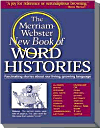

| Book of the Month | ||
 |
The Merriam-Webster New Book of Word Histories |  |
Publisher: Merriam-Webster
Author: -
$19.95
ISBN 08-7779-603-3
Etymology is the study of where words came from, and how they came to be used as they are today. However, Massachusetts publishers Merriam-Webster decided that rather than produce an etymological dictionary (there are some good ones already on the internet) they would instead select some 1500 of the most interesting words and tell their stories. Because the description of these words has been made easier for non-specialists to understand, this is not really an etymological dictionary. As the name of the book says, this is a collection of 'word histories', from 'Abigail' and 'abound' (from the Latin 'to rise in waves') to 'zygote' a biological term which originally described how oxen were joined together at the plough.
This book is neither one thing nor the other. It is not comprehensive enough to used as a dictionary, but neither does the text flow enough for it to be read as a text. However some 600 of the entries are long enough to count as articles and these are both easy to read and often fascinating. For example we learn that the formal dress called a 'tuxedo' comes originally from the American Indian word for 'wolf'. Young men in an upper-class New York area called Tuxedo Park first started wearing these particular dinner jackets, and the jackets got their name from the area.
The book starts with a preface explaining its purpose, and a standard history of the development of the English language from the beginning to the present day. Some things which would be of great interest to students of English - such as the Great Vowel Shift of the 1500s (which explains why we say, for example A as both 'ah' and 'ay') are unfortunately only mentioned briefly. The editors are keen to get down to the main part of the book - 526 pages of word histories. The rest of the book, including preface, introduction and list of abbreviations is only 17 pages. There is no bibliography or index.
As might be expected of a US publisher, some words such as 'boondoggle' which are not well known outside the USA receive long descriptions while British English words such as 'wicket' (originally a small gate, now an important part of the game of cricket) are ignored altogether. The definition of the word 'feisty' mentions several similar words with the comment 'these are no longer in use' while being apparently unaware that one of them refers to a hair-raising sexual practice. This omission is not to protect the young and innocent as this book is written for well-educated adults with a level of language to match.
Who is this book for? A language student will find this a valuable aid to vocabulary, as learning about a word helps one to understand it. However because the language is advanced, many students who most need to learn these words will struggle with the vocabulary used to describe them. The book would serve best in a library, or perhaps as light reading while travelling.
Verdict: Not a dictionary, nor anything else - but interesting.
Assessment 6/10